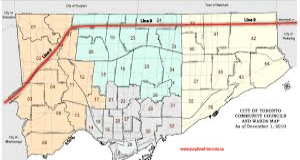Amanda Lickers —
At 6am Dec. 3, members of Rising Tide Toronto successfully shut down construction for Enbridge’s Line 9 pipeline in North Toronto. Five people,  including two priests, locked down to equipment to prevent further work on this project. Approximately 40 workers were sent home for the day and activists continue to occupy the construction site.
including two priests, locked down to equipment to prevent further work on this project. Approximately 40 workers were sent home for the day and activists continue to occupy the construction site.
The National Energy Board has not approved the reversal of the Enbridge Line 9 pipeline. Amidst outstanding land claims and treaty violations all along the route, there has been no consultation with First Nations. This pipeline must be decommissioned and construction towards this project must stop.
We are taking a stand today because this project will facilitate the expansion of the tar sands. Moreover, this reversal puts the millions of people along line 9 route at risk. The health of Aamjiwnaang is suffering from the effects from Canada’s Chemical Valley as a result of Environmental Racism.
We need to act now in defence of the land we depend on before Enbridge permanently destroys our territories. This is a human rights issue that effects future generations of all peoples.” – Vanessa Gray, Aamjiwnaang and Sarnia Against Pipelines
Line 9 Facts:
Every First Nations band council that intervened in the NEB process said that they had not been consulted in accordance to the Canadian consultation.
NEB has not yet approved the Line 9 reversal. If the NEB recognizes the Canadian constitution, they are obligated to not approve this proposal.
Enbridge said it will idle Line 9 if its application to reverse and expand the pipeline is rejected by the National Energy Board.
Enbridge’s Line 9B is the first pipeline proposal to come under the authority of the new rules hidden in Harper’s omnibus budget Bill C-38 passed in July 2012.
Enbridge refuses to carry $1 billion in insurance to cover the costs of a possible spill, arguing that it is unnecessary. Meanwhile, clean up for Enbridge’s Kalamazoo disaster has cost over $1 billion in an area with a population of 7,000.
By Enbridge’s own admission, their computation pipeline monitoring system “will not detect a leak below 70.5 [cubic metres], 443 [barrels] over a two-hour period”.
Richard Kuprewicz, a pipeline safety expert with over forty years of experience in the energy sector, says the probability of Line 9 rupturing is “over 90%.”
 TheBulletin.ca Journal of Downtown Toronto
TheBulletin.ca Journal of Downtown Toronto

